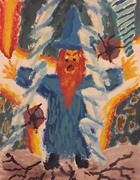|
c.s. friedman's coldfire trilogy has several types of magic and literally does explain it as field generated by the planet or something
|
|
|
|
|

|
| # ? Jun 3, 2024 11:21 |
|
wait Police sometimes consult with psychics who claim to have paranormal powers to solve crimes that makes Dresden entirely within your own definition of reality
|
|
|
|
The reason that I brought up Chitty Chitty Bang Bang earlier is that its magic serves exactly the same function that money does in the Bond books. It makes a car fly and be loaded with convenient gadgets. Chitty Chitty Bang Bang could have been built by MI6 and would be absolutely no different.
|
|
|
|
chernobyl kinsman posted:"given the right circumstances" such as, in the case of hamilton's night's dawn trilogy, a parallel hell dimension full of evil souls who escape to possess the bodies of the living, enabling them to shapeshift and shoot fire from their fingertips chernobyl kinsman posted:or, in the case of dan simmon's illium and olympos, the existence of at least two gods, one witch, and several authors whose minds are so singularly powerful that they can create alternate realities through sheer imagination I haven't read anything here but the first Hyperion book so I cannot comment sufficiently. But it probably falls under "all sufficiently advanced technology is indistinguishable from magic" where the technological explanation is "it's really really really advanced." Lord of Light is arguably more fantasy than science fiction because it has gods and demons even if those gods and demons are all supported by nanomachines or whatever and even as the story is explicitly a planetary colony of humans that originated from Earth. Either way though, aliens are more real than wizards because there could hypothetically be aliens in the billions of trillions of galaxies in the sky that we can't even see, and it's possible those aliens could find a way to get to us. But there sure as gently caress aren't any wizards unless they are aliens too.
|
|
|
|
The Ninth Layer posted:But it probably falls under "all sufficiently advanced technology is indistinguishable from magic"
|
|
|
|
Answer the question about James Bond fighting a wizard coward
|
|
|
The Ninth Layer posted:I haven't read anything here but the first Hyperion book so I cannot comment sufficiently. But it probably falls under "all sufficiently advanced technology is indistinguishable from magic" where the technological explanation is "it's really really really advanced." no the Quiet is literally God and Setebos is literally a god and the actions of the author's minds are unaided by technology how far do you need to twist the laws of physics before they become magic also Mel Mudkiper posted:Answer the question about James Bond fighting a wizard coward
|
|
|
|
|
Out of the Silent Planet is fantasy because there is no God.
|
|
|
|
A fantasy novel is one that lets nerds bond with fellow nerds. Really. You can talk all you want about literary distinctions but if I bring up 100 years of solitude at the D&D table, I get blank stares. If I bring up Brandon Sanderson I get instant recognition. We can point out that The Castle in the Forest is literally narrated by a devil but if you mention Norman Mailer to nerds they will have no idea who he is. James Bond fighting a wizard is thus NOT fantasy because non-nerds will recognize James Bond and the franchise isn't designed to appeal to nerds. Kingkiller on the other hand is a crappy nerd escapist fantasy that, as BotL points out, is nerdy crap meant to appeal to nerds. N.K Jemisin is an award-winning fantasy novelist because the award is voted on by nerds, not because she had to go head to head with Richard Wright or Hilary Mantel. The entire deal with the fantasy genre is that it lives in its own microcosm where people don't debate the quality, they use it as a nerd code to self-id into being nerds. People don't talk about Harry Potter or whatever for the prose, they just bullshit dumb nerd fan theories or how riding a zombie t-rex is totally, like, cool. Prove me wrong.
|
|
|
|
|
Sham bam bamina! posted:The Chronicles of Narnia posits that our world is part of a multiverse that can be traversed through breaches between universes. It explicitly connects itself to our reality and even tries to ground itself in the Christian theology of our reality. But because Mr. Tumnus is a faun instead of a green alien, it's fantasy instead of sci-fi. What Mel is getting at is that this is a silly idea that your arguments don't actually defend. While Narnia is an extreme example, the problem with fantasy is that it does ground itself in reality. If you set a Brandon Sanderson novel on a planet in some distant galaxy and explained the magic system as a field generated by the planet's moons or whatever, you would have the exact same story regardless of the arbitrary change in word choice. That is why this thread exists. You might have a similar story but it would feel very different. It's been a long time since I read Narnia but for me at least the appeal was that Aslan and Narnia were not real but I could still visit Narnia and hang out with Aslan as long as I kept reading. It was someplace I could explore even if only through imagination and guided by Lewis' prose. I suppose you could write the same story if aliens had abducted the kids or teleported them instead of them walking through a wardrobe but I don't know if it would be quite as appealing. There is no reason why Kaladin from The Way of Kings could not be a Russian peasant conscripted into fighting in World War II instead of a villager conscripted into a fantasy chasm bridge crew. But the feeling of the story would be vastly different. The appeal would be very different. For one thing, I don't always want to pick up a book and find myself reckoning with the atrocities experienced by countless millions of real Russian soldiers who fought and died in World War II. Black Mirror is science fiction show grounded in our modern reality in ways that are anxiety-producing, even if it is not very realistic. The same stories with technology replaced with magic would be vastly different. A story of an enchantress bewitching someone into a five thousand year nightmare is orders of magnitudes less frightening than that of someone copying a brain state into a cookie to be tortured for five thousand years. Both would be horrible experiences, but only one is threatening because only one lays claim to reality. It is a core appeal of fantasy that the stories described in these books are severed from pretenses of reality and explicitly cannot happen. The atrocities and awful events cannot happen to real people. The criminals in fantasy stories are not contributing to immoral societal systems because their societies do not exist beyond vague analogues in real life. This is why Vlad Taltos would be a disgusting character to follow in real life but can be a charismatic killer in his fantasy world. It is safe to root for con man Locke Lamora in his own story, because none of us will find out tomorrow that street urchin swashbucklers defrauded our grandmothers. We can visit these characters and places, and then come home, and they will not follow us.
|
|
|
|
James Bond fought a wizard and you refuse to acknowledge this
|
|
|
|
I really enjoyed the longer takes on errors in tone, diction, theme, and characterization as opposed to these interminable arguments about what is a dragon and what is a fantasy novel. It's regrettable that the smart people in this thread are arguing about that as opposed to tearing up some passages.
|
|
|
|
Sham bam bamina! posted:The reason that I brought up Chitty Chitty Bang Bang earlier is that its magic serves exactly the same function that money does in the Bond books. It makes a car fly and be loaded with convenient gadgets. Chitty Chitty Bang Bang could have been built by MI6 and would be absolutely no different. Chitty Chitty Bang Bang developed by MI6 would be KITT, the artificial intelligence car from Knight Rider. In terms of abilities it might be identical but in terms of its relationship to the story's reality it would be very different. Mel Mudkiper posted:James Bond fought a wizard and you refuse to acknowledge this I haven't seen it so I can't comment beyond what it says on wikipedia.
|
|
|
|
The Ninth Layer posted:Chitty Chitty Bang Bang developed by MI6 would be KITT, the artificial intelligence car from Knight Rider. In terms of abilities it might be identical but in terms of its relationship to the story's reality it would be very different. Why is a talking AI Car reality but magic car not reality You seem.to be suggesting a car that can teleport and sing and dance and cook spaghetti is more plausible than a car that is completely normal but runs on fairie dust as long as the singing car is "science" and not "magic" quote:I haven't seen it so I can't comment beyond what it says on wikipedia. It is a wizard and James Bond fights him and he uses magic to fight back
|
|
|
|
Mel Mudkiper posted:Why is a talking AI Car reality but magic car not reality I already have a talking phone and there is nothing magical about it. A car that humans programmed to cook spaghetti and drive itself is a lot more plausible than a car that spontaneously developed the ability to do so. I'll grant you that we may be waiting a long time for humans to figure out how to make teleporting cars.
|
|
|
|
this is worse than the dragon argument
|
|
|
|
|
I feel like we have taken a very circuitous route towards the cliche "scifi waves its hands and says 'poof, its science' while fantasy waves it hands and says 'poof, its magic'"
|
|
|
|
The tech and some things that happens in 007 (and many other action movies) is so absurd and beyond what our knowledge of physics allow that I wouldn’t be surprised if James Bond studied at Hogwars before going to the mi6
|
|
|
|
Mel Mudkiper posted:I feel like we have taken a very circuitous route towards the cliche "scifi waves its hands and says 'poof, its science' while fantasy waves it hands and says 'poof, its magic'" Yes. The former bases its impossibility in terms of reality, justified theoretically or speculatively or not at all. The latter bases its impossibility in terms of unreality. The two can be functionally interchangeable in terms of a story but their thematic and symbolic implications are very different. Does it matter if the consciousness stack chips in Altered Carbon work because of incredibly advanced science or because really good wizards managed to scan peoples' brains with their magic spells? In terms of how they function in the story, no not at all. But it matters a great deal to the themes of the story. Altered Carbon with magic orbs would lose its historical continuity to our own world. The significance of this plot device would be undercut by its blatant unreality. The reader would approach the story in a different way.
|
|
|
|
The Ninth Layer posted:Yes. The former bases its impossibility in terms of reality, justified theoretically or speculatively or not at all. The latter bases its impossibility in terms of unreality. Sham bam bamina! fucked around with this message at 06:56 on Nov 15, 2018 |
|
|
|
The Ninth Layer posted:The former bases its impossibility in terms of reality, justified theoretically or speculatively or not at all. The latter bases its impossibility in terms of unreality. Problem is that most of the stuff that may seem theoretically or speculatively possible (“what if alien tech”) is actually impossible and completely unreal for our reality. The computer doing stuff in a series like Altered Carbon only seem more plausible than some magic cristal orb from a point of view thats either choosing to ignore physics/science/whatever (expecting scientific accurate literature/movies is the way to madness) or doesn’t have that knowledge. While we don’t have all the knowledge of how our universe works we do know that some things aren’t possible (even with ultra high late stage science) so it’s not even “sufficiently advanced tech is indistinguishable from magic” they’re literally using magic in those sci-fi/spy movies/etc.
|
|
|
|
The Ninth Layer, your definitions of sci-fi and fantasy are circular. They only hold true for the works for which they hold true. Tons of sci-fi doesn't bother with "basing its impossibility in terms of reality" (lol), and it doesn't take much effort to come up with examples. Kurt Vonnegut and Ted Chiang just invent some aliens with with a nonlinear awareness of time. In Breakfast of Champions, Vonnegut riffs on the sci-fi cliché of planets with single defining characteristics, like a planet whose inhabitants are all automobiles. Ursula Le Guin's most widely read stories, Omelas and Lathe, go to zero effort to connect their core conceits with known reality via technology or whatever. Ditto Annihilation or almost anything by Lovecraft. Likewise plenty of fantasy worldbuilding (ugh) rests on some tweak to the history of technological progress (off the top of my head, anything steampunk would fit this category).
|
|
|
|
Sham bam bamina! posted:You're not really wrong, but the problem is when "magic" is approached rigorously and mechanistically enough that the distinction breaks down, when a story tries to have things both ways by justifying impossibility "in terms of unreality" while insisting that the unreality be real anyway. I gave that example of the moon field not to say that a different mindset could be applied to Brandon Sanderson's writing but to show that it already has a determinedly rational mindset. A superficially "scientific" explanation would fit his worlds because he writes them "scientifically" in the first place. Not every case is so extreme, but this need to ground everything in possibility is entrenched in the genre. Sure, it would not be hard to port any Sanderson story to some hacked up science fiction setting where say instead of "metal eating magic is real" it's all special enzymes that create superstrong magnetic fields and so on, to the point where the people flying around are described in purely physical terms and it's all couched in terms of scientific possibility. The flip side though is that when Gandalf casts a magic spell we take it for granted that it's the spell he intended to cast. He can make magic smoke rings and firework dragons and big bangs, he knows how to cast these spells even if we don't. When Harry Potter waves his hand a certain way and says Wingardian Leviosa he can levitate objects, but only if he does it right. When Ron's wand fucks up we don't know why but we can assume Ollivander would know why and how to fix it. In that respect the only major difference between Snape's potion book and Mistborn's periodic table of metal magic is that you get to see the periodic table the metal eaters use. I think Sanderson gets too far into video game territory where his magic systems end up approximating game system approximations of magic, and you can see Kaladin's stormlight mana bar run out as the pages turn. But the advantage is that you are given Kaladin's move list and his world's magic become accessible to the reader.
|
|
|
|
Fantasy presents a speculative paradigm that is wholly different or overlayed on our existing one, while sci-fi speculates about things that may change our existing paradigm. (also one has wizards, one has spaceships)
|
|
|
|
Is an AI a dragon?
|
|
|
|
|
More of a basilisk, I think.
|
|
|
|
I have a sincere question: Mel's comment about a lot of fantasy not actually being terribly "fantastical" is interesting to me and I would be curious to know whether anyone has any views on what the most genuinely "fantastical" fantasy might be. Does anyone have any thoughts?
|
|
|
|
As far as I am concerned Lord Dunsany often does a good job at capturing the fantastical. In particular as one of his common themes is the intrusion of the fantastical into the non-fantastical, check out his The King of Elfland's Daughter for example.
|
|
|
|
Wheat Loaf posted:I have a sincere question: Mel's comment about a lot of fantasy not actually being terribly "fantastical" is interesting to me and I would be curious to know whether anyone has any views on what the most genuinely "fantastical" fantasy might be. Does anyone have any thoughts? As someone mentioned before, a lot of children's fiction is often way more willing to be fantastical Phantom Toolbooth. Lion Witch and the Wardrobe, The Little Prince, etc.
|
|
|
|
The poster The Ninth Layer is, by their own definition, a fantasy because there is no way that anyone could realistically be that stupid
|
|
|
|
fridge corn posted:The poster The Ninth Layer is, by their own definition, a fantasy because there is no way that anyone could realistically be that stupid I wouldn't go that far He's patently wrong but I think that has more to do with the fact that he assumes his personal way of interpreting events in the text is a universally applied principle for all readers i.e. the people getting killed in Godzilla are real and the hobbits getting killed are not real
|
|
|
|
I've heard film critics refer to "heightened reality" to describe the settings of, say, most action movies. Is that relevant?
|
|
|
|
Wheat Loaf posted:I've heard film critics refer to "heightened reality" to describe the settings of, say, most action movies. Is that relevant? Well I mean, any good movie gets drama by making a connection between the events on the screen and identifiable experiences and paranoia of the "real" world. Most action films exist in a sense of "heightened reality" because action films are mainly about relieving feelings of powerless in the audience through cathartic violence. Its hard for that catharsis to be accomplished if there was not the sense of "reality" in it. That being said, my issue is more with the idea that fantasy is devoid of these ideas. I do not so much disagree with the idea that we are asked to believe the characters in a fictional story are "real" as a method to create attachment to them as much as I disagree with the idea that fantasy doesn't do this.
|
|
|
|
Wheat Loaf posted:I have a sincere question: Mel's comment about a lot of fantasy not actually being terribly "fantastical" is interesting to me and I would be curious to know whether anyone has any views on what the most genuinely "fantastical" fantasy might be. Does anyone have any thoughts? A lot of Ray Bradbury's stories make good use of the fantastic, The Illustrated Man and The Veldt being two prominent examples, as well as basically every short story in The Martian Chronicles.
|
|
|
|
It's interesting because it isn't something that occurred to me before - I suppose that's why I mostly quit reading a lot of fantasy, there were too many rules. I still enjoy most Kim Newman books, which are fairly mainstream fantasy (comparable to Neil Gaiman, I suppose), because they have magic but don't tend to be too pre-occupied with rules about how it works. Kim Newman books might make for amusing fodder for folks in this thread. I like them, but I'm sure they would get a right roasting here. :p
|
|
|
|
Wheat Loaf posted:It's interesting because it isn't something that occurred to me before - I suppose that's why I mostly quit reading a lot of fantasy, there were too many rules. I mean, I have suggested it before but the problem with fantasy is that as a genre it is not actually defined by the fantastical, but instead its essentially a product description meant to signal a certain kind of consumer. Modern fantasy as a genre has no greater meaning than "it is meant for those who read fantasy" The entire genre is a marketed product Fantasy is not a genre, it is a brand
|
|
|
|
Mel Mudkiper posted:The entire genre is a marketed product How is that different than insert music genre? Genre's in books much like music are better traced through the influences and the community which yes makes it more brand-like, eventually a genre(sub genre) becomes so incestuous with itself it can't attract new readers as the old ones slowly go away, until it dies off hopefully to be reborn later when new ideas get injected. Following deeper and deeper into stuff can be fun as the books tend to get crazier and more experimental as you get closer to a crash. I like good music, but I also like new music that's trying stuff out even if it...kinda doesn't work out, and a lot of that more experimental music can only be understood/enjoyed through a lens of what came before it.
|
|
|
|
Strom Cuzewon posted:Fantasy presents a speculative paradigm that is wholly different or overlayed on our existing one, while sci-fi speculates about things that may change our existing paradigm. Great, I was just thinking that what this thread really needed were even more definitions so vague that they describe all of fiction as well as many essays and academic papers
|
|
|
|
~speculative paradigms~
|
|
|
|

|
| # ? Jun 3, 2024 11:21 |
|
ShinsoBEAM! posted:How is that different than insert music genre? It isnt Most genres of music are also synchronous only in consumer marketing
|
|
|



















